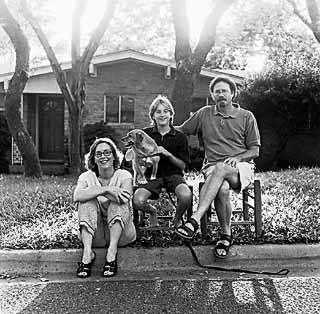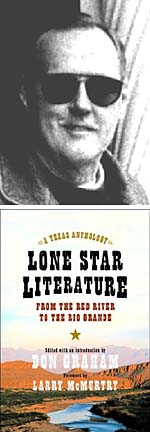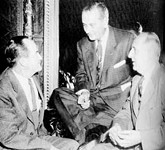How to Be a Popular Girl
What Will Sarah Bird Do Now That She's Back in the Limelight?
By Dick Holland, Fri., June 22, 2001

Sarah Bird is coming over for lunch and she's promised to bring her latest production -- the soundtrack to her new novel, The Yokota Officers Club. Her e-mail had said: "You'll get my Napster when you pry the mouse from my cold, dead hand."
Later, she will dance, but now, as we visit over pimiento cheese and root beer, we hear, from the other room, "Brown-Eyed Girl," the Van Morrison classic important to the plot of the novel since it's the featured number in a go-go dancing competition. Also prominent in the soundtrack are Peggy Lee purring "Fever," Burl Ives harrumphing "The Donut Song," Gene Autry advancing the argument that he's an old cowhand, Dean Martin crooning "Besame Mucho," and Bobby Goldsboro's truly awful "Honey." Laid onto all this are the British Invasion nuggets "Needles and Pins" by the Searchers and "She's Not There" by the Zombies, and a couple of radio hits we'd just as soon forget from the same years: "Up, Up and Away" and "Cherish."
The song selection illustrates different moments in the novel, all based on character: The Air Force mother Moe is a WWII songbird who knows every pop tune from that era, the cute and outgoing sister Kit is devoted to the Top 40 of the middle and late Sixties, and, as for the protagonist and heroine, Bernie: She's the girl whose musical taste is razor-sharp and with it. Bernie is the dancer in the family.
If, some months from now, every new novel comes with a soundtrack, you can say that Sarah Bird did it first and that you read it here. Aural memory is a powerful thing. Bird juxtaposing "The Ballad of the Green Beret" by Staff Sgt. Barry Sadler with the Who's "Can't Explain" brings an era crashing back to us -- just like her transparently evocative novel does. Eat your heart out, Proust -- Sarah Bird don't need no stinkin' madeleines. The girl has her Napster.
During lunch, the matter of the curriculum vitae comes up. It is a document of some complexity and puzzlement. It begins like a proper résumé, with the important stuff first: four novels published between 1986 and 1993 -- Alamo House: Women Without Men, Men Without Brains, The Boyfriend School, The Mommy Club, and Virgin of the Rodeo. Each novel is accompanied by rave notices: a starred review in Publishers Weekly for Virgin, enthusiastic blurbs for the others from Vogue, Entertainment Weekly, The Boston Globe, and The Los Angeles Times, and then a list of prizes.
Next up on the CV, more or less explaining the eight-year gap from the last novel to this new one, is a list of the screenwriting. In 1990, her own adaptation of The Boyfriend School was made into Don't Tell Her It's Me, a Steve Guttenberg-Shelley Long movie with a shelf life of about 10 minutes.
Then follows a dozen or so made and unmade films and television shows. Two of the highlights for Bird were her adaptation of the novel Dog of the South, which placed her in proximity to her literary hero, the quietly hilarious Charles Portis (True Grit, Norwood), and a location shoot that landed her in Borneo with Isabella Rossellini. Oh, and then there was the script optioned by Meat Loaf's production company.
The farther south the reader travels in the résumé, the earlier the chronology. Now we're getting into some terra incognito -- formative experiences, that kind of stuff. Sipping root beer at the dining room table, we hear Cannibal and the Headhunters' wailing version of "Land of a Thousand Dances" drifting in from the kitchen, and begin a mutual exploration of her pre-novelist past, beginning with the official version.
Sarah Bird Résumé, p. 2:
Jobs:Sold Western wear at Penney's; worked on archeological digs at Taos Pueblo; go-go dancer in Tokyo; psychiatric aide at Mercy Hospital, San Diego; receptionist at Albuquerque Paint and Body Shop; clerk at Lighting Fixture Store; scuba diving instructor, Costa Brava, Spain; au pair for family in Tignes, France; botanical garden guide in Palafrugell, Spain; lifeguard/swimming instructor at Kadena Air Force Base, Okinawa.
Produced Texas Mental Health Mental Retardation Agency publication. Traveled throughout Texas to interview and photograph schizophrenics, psychiatrists, Down's Syndrome residents, aides, researchers, autistics, all the people who live in and work at the state's institutions.
Journalism:
Published articles and essays in The New York Times Sunday Magazine, Mademoiselle, Glamour, Cosmopolitan, Seventeen, MS, Texas Observer. Was an editor and wrote a monthly personal essay column for Third Coast. Have appeared in Texas Monthly.
I wrote on such subjects as the forbidden world of Mormon gays at Brigham Young University; an Apache coming-of-age ceremony in White Mountain, Arizona; the Gallup, NM, Intertribal Ceremonial and Rodeo; my surprise wedding; parents kidnapping their own children; women on offshore oil rigs; a nightmare in paradise: hiking Kauai's Napoli coast with an alcoholic local guide and the winner of a college essay contest; the disappearance of small-town African-American rodeos; life and death of a society columnist; autism; the Penitents of northern New Mexico; the Japanese snow monkeys of South Texas; a transsexual's spiritual journey; moody men; bloodsucking women; and, how to be a popular girl.
Personal:
I grew up in a Catholic Air Force family of eight. Went to five different schools in fifth grade. Spent my happiest years in mostly Mexican-American Catholic schools. Lived with my family and on my own in Japan, Okinawa, France, Spain, the Yucatan Peninsula, and most of the western states, though I've lived the longest in Texas and love New Mexico the most. Degree in anthropology from the University of New Mexico. Journalism fellowship at the University of Texas. My thesis was a photojournalism project on the vanishing world of old lady beauty shops.

Married to George Jones (not the dipsomaniacal C&W singer). Have one son, Gabriel. Live in Austin in the great state of Texas, number one in prison population!
Like most synopses of a full life, this one is both forthcoming and withholding, just like Bird herself. It takes a while to realize the depth to which Sarah Bird understates her own life; she is the product of a family who looked primarily to themselves as the basic social unit. There are two aspects to her tendency toward understatement: The first is her sincere belief that no one else would or could possibly be interested in her life, and the other is that no one else should be -- a deeply felt sense of privacy. That both her public adventures and personal pleasures and pains are for herself, her family, and a few close friends. But here's what we discovered anyway.
She drifted over to Austin from Albuquerque in the mid-Seventies, with the love of her young life (they met when she was 15). The young love of her life turned out to be a most unreliable boyfriend. She began working as a freelance journalist about 1975 -- "My first big story was about a male-to-female transsexual for the old Austin Sun, for which Jeff 'Nightbyrd' stiffed me." In graduate school at UT, Bird began working on a photo-essay book about "mutant" rodeos: black, women, Mexican, gays, kids. She wrote for Cosmo and had a teen advice column for Seventeen. For People she wrote about boys finding dope money their dad had buried in the back yard. She wrote for what she calls the "Trues": True Confession, True Stories, True Pulp Fiction. "I wrote about kidnapping my own child," she recalls, "and falling in love with a man who'd been a woman."
On April Fool's Day, 1979, she landed a day job, writing an "in-house organ" for Texas Mental Health Mental Retardation at the grand salary of $7,500 per. "And saved money on that in Austin in 1979 when you could buy that chicken fried steak the size of a hubcap at the Stallion for what? Thirteen cents." In August of that year, she met her future husband George at AquaFest, just down from the turkey leg stand.
Some combination of an impossible-to-suppress literary ambition and an innocent notion that writing books earns you money led her to produce a suspense thriller with a fiendish red-and-black cover titled Do Evil Cheerfully for which Avon paid $3,000. They then proceeded to dun her for the portion of the advance that the book did not realize for the next 10 years. The book was a revenge plot based on the UB (unreliable boyfriend) who in real life got involved in Scientology, left to take a "training course" in L.A., and disappeared for seven years. "He ended up marrying Mimi the actress who then left him for Tom who left her for Nicole -- if I'd only had the foresight to cultivate something sexually transmissible, I could have taken out a dynasty," she quips. Then Bird quit the state job with a new belief that "there are worse things than starving to death."
Austin Chronicle: We don't believe we're familiar with the concept of the "surprise wedding."
Sarah Bird: I was almost 30 and George was 27. We'd been living together for a year or so. I'd quit my job at MHMR and was slowly starving to death in my freelance/baby novelist incarnation when I started having problems with an old back injury I'd gotten skiing. George was working for the city at the time and we decided that the thing to do was get me on his insurance. So we filled in all the applications listing me as "spousal equivalent." The city bounced this social innovation back to us and said they needed to see a license. So one chilly November day I, literally, rolled out of bed and crab-walked up the steps of the courthouse with George. We filled out an informal declaration of marriage which was stamped by a clerk, L. Carbajal, and we were declared married. L. Carbajal told George that would be $7.50 and my new husband whipped out his wallet, carefully extracted $3.75, put it on the counter and asked me, "Where's your half?" I paid up and L. handed over our Honeymoon Gift Pack, which included a sample bottle of Listerine, two regular Tampaxes, a bar of Dove (1é4 cleansing creme), and a sample tube of Crest. It was a deeply romantic moment. I got on George's insurance. My back cleared up and, since neither of us regarded the "ceremony" as much more than leaping a bureaucratic hurdle, we didn't tell anyone that, in the eyes of the state, we were man and wife.
After three years of being secretly married, we decided to go public. I told my friends Nancy Gates, Mary Ellen Nudd, and Judy Osborne, and they thought it was kind of pathetic. A few weeks later, Mary Ellen invited George and me to dinner. Potluck. I was assigned a spinach salad. It was August, or one of the many months in Austin that feels like August. I was getting my period, took a shower at the last minute to try and pull myself together. Had the mandatory PMS fight with George in the car on the way over. So, we're standing at the door, me holding a giant bowl of spinach, hair still wet, cramps coming on, really grumpy -- the door opens and there are 60 of our friends in tuxedos and gowns. There's a giant cake with a bride and groom on top. There are napkins with our names. It was wonderful. Terry Galloway, creator of Jake Ratchett, Short Detective, for Esther's Follies, "married" us, reading from my romance novels. She made George vow to "fondle" all appropriate parts and me to promise to surrender to the "whirling vortex of desire" and for both of us to fill all "aching chasms." A surprise wedding -- it was a great, great evening.
SB's nom de romance was Tory Cates and, writing 10 pages a day, she quickly cranked out four books, although when she went to a romance writers convention in Dallas she met other writers who, like clockwork, produced a book a week. Her first two were Handful of Sky, a rodeo romance, and Where Aspens Quake, the story with a zippy male lead -- a proctologist/acupuncturist. "The last and suckiest of the sucky titles was Cloud Walker, about hot air ballooning" she recalls. "I wanted to call it Blown in a Balloon because the genre discovered oral sex about the time I was writing this one and my editor requested I insert three such scenes. I gave her two but made her beg." We ask about how strict the romance formula was back then. "Not as formulaic as haiku. You get more syllables, but a hell of a lot of them better be moist. Or at least throbbing. When I wrote the first one, set in the 'glamorous' world of rodeo, the editor made me take out any aromas that were not exclusively floral-based. And all drug references -- which eliminated the two major realities of the circuit right there: manure and pharmaceuticals."
By the time the pimiento cheese is gone, SB has demonstrated her go-go moves, dancing barefooted on the kitchen floor, with her eyes closed, to Van Morrison, just like the character Bernie in the new book. Life imitating art imitating life.
Sarah Bird's first "legit" novel was Alamo House, published by W.W. Norton. The book is a dead-on accurate picture of the old West Campus, about the time the Co-ops had really established themselves in territory that in the Fifties had been exclusively devoted to UT fraternity and sorority houses. By the Seventies, some of these relics remained posh and almost dignified, and some were just fake-genteel and beginning to be run down. Bird's attraction to outsiders is evident in the female population of a women's cooperative that was loosely based on the real Seneca House, strategically placed right across the street from the ATOs. The book contrasts the vegetarian, braless inhabitants of the Co-op with the juvenile and swinish frat boys in a way that rings totally true for that neighborhood in the 1980s. The principal subplot involves the protagonist working in the LBJ Library as a clerk, where she archivally processes Luci Baines' wedding cake, and where one of her co-workers is a young man who mainly sleeps on the job and at night leads a rock band called "Little Lyndon and the Great Society." The book immediately won a following for her.

SB had been drawn to the world of the "alternative" rodeos ever since she had first seen the (late, lamented) Texas Prison Rodeo in Huntsville. When her rodeo photographs were exhibited at the Southwestern Writers Collection in San Marcos, a general favorite was the one of a crusty old character at a Navajo rodeo ostensibly giving her a hug but really slipping his hand down her pearl snap Western shirt. This one became the jacket photo for Virgin of the Rodeo, a book that turned out to be something of a struggle to write and was the only one of her books that was not universally liked by her group of Austin literary pals.
Virgin received many good reviews, but its presentation appeared to be a little confused. Particularly when Bird, driving back to Austin from Albuquerque, pulled into a truck stop in Clovis, walked in and saw a big cardboard display of the hardcover edition of the novel. From its proximity to the paperback porn books ("for the one-handed truckers of America") it was clear that Virgin of the Rodeo, with its somewhat kinky jacket photograph, had taken a deviant path in some markets.
The Mommy Club was conceived around the time Gabriel was. Sarah's one good memory of education as an Air Force child were the two years she spent in Catholic school in San Antonio, and her informed affection for the city just shines through the book. Whether it is the strange old King William neighborhood or the surrogate mother-to-be protagonist hanging out at Schilo's deli, across the street from the San Antonio River, the setting of the book never misses a beat.
But it was impending motherhood that drove The Mommy Club. "I had planned to make my heroine, Trudy, give up her baby at the end because the point of the book, when I started, was that not everyone should be a mother. I finished the book after he was born and spent weeks trying to write the scene where she gives her baby away and absolutely, physically could not do it." A new soulfulness is evident in this book, a quality that Bird quickly acknowledges. "It was as if after I was pregnant and had Gabriel, I became permeable." The Mommy Club also expanded SB's fan base, already large. The new depth in her writing took her out of the category of being a strictly comic novelist and to this day she gets telephone calls from fans of the book, some with complicated childbirth stories to tell her.
Sarah Bird in Hollywood or Santa Monica or wherever the business of screenwriting takes place is not an image that focuses clearly. Show business is young and cocky, and the stereotype of the successful screenwriter is that of a Type A personality who can pitch all day long. Although her novels were admired in some quarters on the West Coast, SB's is a personality further down the alphabet, one who is most comfortable hanging out with her family and friends, sharing private jokes, not participating in group creativity where the style has an edge. One of Bird's great Austin screenwriting friends is Kathleen Orillion, who teaches at UT's Michener Center.
"I think Sarah and I immediately bonded because we recognized in each other the dilemma of being meek, introverted, and testosterone-deprived while trying to eke out a living in the cutthroat world of screenwriting," she says. "Sarah's natural tendency is to be modest and unassuming, but these qualities are not particularly appreciated in Hollywood. Downplaying your ideas doesn't really go over well in a pitch meeting."
Orillion reminisces about some time she and SB experienced this foreign environment together: "I think our friendship was solidified during a stay at a swank hotel in Santa Monica [courtesy of a TV movie gig she had] when we fancied ourselves Career Gals, washing our nylons out in the evenings, ô la Eve Arden and Jane Russell, lamenting the humiliations of the day, and bolstering each other for the next day's round of bullets."
The 1990s in literary Austin was a period when the book was abandoned for the script. Talents as diverse as Bud Shrake, Bill Broyles, Larry Wright, and Steve Harrigan seemingly quit their fruitful (but perhaps not monetarily rewarding) fiction and nonfiction writing, all to be seduced by the siren song of Hollywood. There is an old saw in American letters that Hollywood corrupts, but what has happened here since the turn of the millennium appears to belie this, with new fiction produced by Shrake (The Borderland), Wright (God's Favorite), and Harrigan (The Gates of the Alamo).
Harrigan wrote two early novels, then concentrated on nonfiction and then took a long time off while he successfully pursued screenwriting work. Then, he finished his long-awaited novel on the Alamo, a book handsomely published and promoted by Knopf, the country's gold-standard house for fiction. Steve and Sarah are Austin contemporaries (he was born in 1948, she in '49) and The Yokota Officers Club is another midcareer novel by an Austin writer who might be considered midlist (not a big seller). Novelist and television writer Jim Magnuson, director of the Michener Center at UT, draws a parallel between the two.
"Like Steve, Sarah began writing novels, was drawn into the world of screenwriting, and then, after a period of time away, came back with a book that had more soul than ever," he says. "It's a story that defies all the clichés about writers being eaten alive by Hollywood. It's also interesting that her novel is unlike anything you'd expect from a Hollywood screenwriter. There are no flashy tricks, and though it's as funny as Sarah's other books, it's the characters that win you over."
By the time SB had completed the new book, her support group of Austin writers all agreed it was her best book yet. And delighted that it landed at Knopf. Kinky Friedman heard the news right away: "Sarah, congratulations," he wrote her. "Goddamn it, being published by Knopf is like getting into Harvard."
But while finishing the novel, Bird was faced with a personal quandary, that of fictionalizing her family. My final question for Sarah at lunch deals with the memoir vs. fiction. Not only how much "truth" is contained in the new novel, but about the memoir craze of the Nineties, one in which books like Mary Karr's The Liar's Club became huge bestsellers.
"Yes, I was strongly encouraged to do this book as a memoir because they typically sell better than novels," she immediately acknowledges. "For several reasons, however, I chose fiction. The major one was that I wanted to get at something a bit larger than the actual facts of my puny life would have allowed me to.
"Beyond that, I could just never see putting forth my version of events, my version of my childhood, of my family as fact. As anyone who grows up with siblings knows, every member of a family has a Rashomon-like perspective that can be so divergent you wonder if you all really grew up in the same house together eating the same hot dogs, watching the same cartoons.
"It just never seemed fair that simply because I torture the alphabet for a living, I would get to be the one to enter the official version of our family's history. From the beginning, I was very clear that it's way more important to have a family than a book. It is a writer's shibboleth that you can't care what anyone thinks about what you write. I just couldn't sign up for that one."
The toughest questions that the still-shy but back-in-the-limelight girl novelist will be asked again and again as she tours with The Yokota Officers Club will deal with the parallels between the real Bird family and the fictional Root family. The honest truth appears to be that there are many similarities, but that the Birds are not quite so scary or screwy, the mother figure not so depressed and controlling, the tough pilot father an actually garrulous, somewhat dreamy figure.
At the end of our lunch, SB shows me the contents of the shoebox she brought over. Included are some smashing photographs of her parents dressed up to go out to a formal military dance, and, right there in the Okinawa newspaper, a yellowing photograph of Sarah, about the time she won the dance contest, a total babe, a real popular girl. ![]()
Sarah Bird will be at BookPeople on Friday, June 22, at 7pm. Dick Holland was the first to exhibit Sarah Bird's literary work and photography when he was the founding curator of the Southwestern Writers Collection at Southwest Texas State University in San Marcos.








